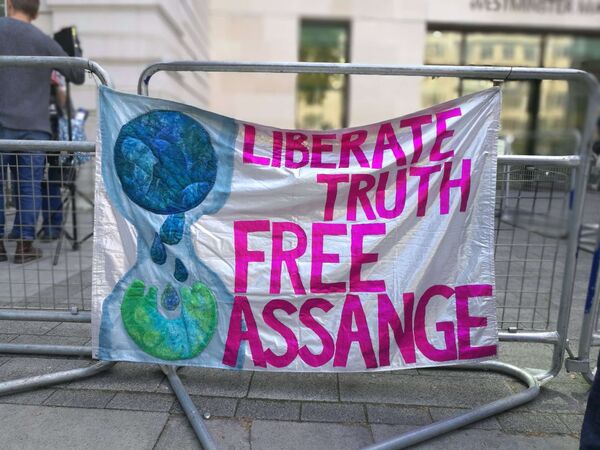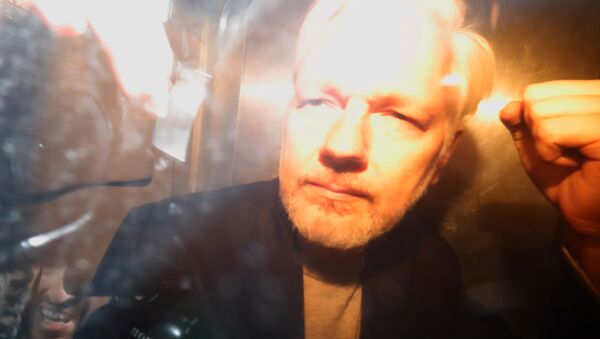Following Home secretary Sajid Javid’s formal request on Thursday to extradite Wikileaks founder Julian Assange to the US, the whisleblower could face eighteen counts of espionage charges from the US Department of Justice (US DoJ) in a Virginia district court over his 2010 leak of hundreds of thousands of classified documents on US military war crimes in Iraq and Afghanistan, as well as human rights abuses in Guantanamo Bay Detention Camp in Cuba.
@FreeWikiPress @action_4assange @WISEUpAction @couragefound @SEP_Britain @WSWS_Updates
— Charlotte Gracias (@CMAGracias) June 13, 2019
In light of today's action by Sajid Javid in signing the request for #JulianAssange to be extradited, please retweet so we get as many people to protest tomorrow.
This is so important. https://t.co/hDTFi78m4K
The Role of the 1917 Espionage Act in Suppressing Whistleblowers
According to the US Department of Justice superseding indictment, Mr Assange has been charged on 18 counts related to the US 1917 Espionage Act; a law defining wartime espionage passed in Congress under then US president Woodrow Wilson after declaring war against the Germans during WWI.
The 1917 Espionage act first allowed US postal offices power to ban publications from being disseminated via mail and prosecute those attempting to obstruct conscription with $10,000 USD and up to 20 years in prison.
To date, the law has been used against former NSA contractor Edward Snowden and whisleblower Chelsea Manning, whom have both made contributions to Wikileaks, among others. Most of Assange’s charges fall under Section 793 – 794 of the 1917 Espionage Act, which was left intact under Title 18, Part 1, Chapter 37.
List of Charges Against Julian Assange under the 1917 Espionage Act
- Counts 1: Conspiracy to Obtain, Receive and Disclose National Defence Information
Alleges that Mr Assange had “knowingly and unlawfully” conspired with Ms Manning to obtain and communicate documents related to detainees at Guantanamo Bay, as well as Iraq rules of engagement files and information on “individuals in Afghanistan, Iraq, and elsewhere around the world” which was “classified up to the SECRET level”, violating Title 18, United States Code, Section 793.
- Counts 2 – 6: Unauthorised Obtaining of National Defence Information
(Two counts of accessing Detainee Assessment Briefs, one count for State Department Cables, and one on Iraq Rules of Engagement Files)
Charges Mr Assange with offences “outside the jurisdiction” of the US with “unlawfully” obtaining documents, writing, and notes on national defence on Guantanamo Bay detainees, US military rules of engagement in Iraq (which Wikileaks documented as war crimes) and correspondences with the State Department. The DoJ alleges that the information was to be used “to the injury of the US” or “advantage” of foreign nations.
Count 5 charges Assange with attempting to obtain information.
- Count 7: Unauthorised Obtaining of National Defence Information, State Department Cables
Charges Mr Assange with accessing information stored on the US Secret Internet Protocol Network classified “up to the SECRET level" in violation of Title 18, Chapter 37 of the US Code.
- Counts 8 - 14: Unauthorised Obtaining of National Defence Information
(Three counts of accessing Detainee Assessment Briefs, two for State Department Cables, and two for Iraq Rules of Engagement Files)
Charges Mr Assange with offences “outside the jurisdiction” of the US with “unlawfully” obtaining documents, writing, and notes on national defence on Guantanamo Bay detainees, US military rules of engagement in Iraq (which Wikileaks documented as war crimes) and correspondences with the State Department. The DoJ alleges that the information was to be used “to the injury of the US” or “advantage” of foreign nations.
Professor Iain Munro spoke to Courage about organizing the open letter in The Independent, signed by 50+ academics & activists, calling for Julian Assange & Chelsea Manning to be immediately released: https://t.co/4nuuaPjJEk pic.twitter.com/Z9lAHJoBa8
— Courage Foundation (@couragefound) June 12, 2019
- Counts 15 - 17: Unauthorised Disclosure of National Defence Information (three counts)
Charges Mr Assange with offences committed around July 2010 up to the superseding indictment related to possessing, accessing and controlling documents related to US national defence who “willfully and unlawfully” attempted to communicate, deliver and transmit information classified “up to the SECRET” level, based on US wars in Afghanistan and Iraq.
- Count 18: Conspiracy to Commit Computer Intrusion
Charges Mr Assange with accessing computers without authorisation to gain information that “could be used to the injury of the United States” and “advantage” of foreign nations, in violation of Title 18, United States Code, Sections 641, 793(c), and 793(e)
What Happens to Assange if Extradited to the US?
According to a 23 May press release from the US DoJ, Mr Assange could face a maximum sentence of ten years in prison for each count except for conspiracy to commit computer intrusion, which carries a “maximum penalty of five years in prison”, totalling nearly 175 years.
I was pleased to sign this letter with a group of academics calling for the release of J.Assange and @xychelsea and for the UK to honour its international legal obligations. https://t.co/c1RBe39eKx pic.twitter.com/knXOCa7pDu
— Mark Curtis (@markcurtis30) June 12, 2019
The DoJ stated that the Wikileaks founder is “presumed innocent unless and until proven guilty beyond a reasonable doubt” and that sentences for federal crimes “are typically less than the maximum penalties”, with a federal district court judge determining his sentencing.
READ MORE: WikiLeaks Chief Editor Reveals Details of Assange's Medical Examination in Prison
But Mr Javid’s request to extradite Mr Assange to the US contradicts Article 3 of the European Convention on Human Rights, which condemns the extradition of fugitives “where substantial grounds have been shown” that the persons would face a “real risk of being subjected to torture or to inhuman or degrading treatment or punishment in the requesting country”.
But others, including former NSA contractor Edward Snowden, voiced support for Assange, stating that Wikileak's intention was to expose war crimes in Afghanistan and Iraq committed by US military officials and a "potential Espionage Act" prosecution "would threaten countless reporters" across major US media outlets, adding that "core First Amendment principles will be at stake".

Assange's defence lawyer, Jennifer Robinson, has asserted that the case was "not about hacking", but rather a "a journalist and a publisher who had conversations with a source about accessing material, encouraged that source to provide material and spoke to that source about how to protect their identity".
"This is protected activity that journalists engage in all the time,” she said in a 2 May statement outside Westminster Magistrate's Court in London, adding that the court case had been launched under former US president Barack Obama and pursued by the Trump Administration.
Nils Melzer, UN special rapporteur on torture and other cruel, inhuman or degrading treatment or punishment condemned the "relentless and unrestrained campaign of public mobbing, intimidation and defamation" against Mr Assange in the US, UK, Sweden and Ecuador, adding that the whistleblower had endured "oppressive isolation, harassment and surveillance" at the Ecuadorian embassy, as well as threats of "violence and even repeated calls for his assassination".
Mr Meltzer said in a 31 May statement: “In 20 years of work with victims of war, violence and political persecution I have never seen a group of democratic States ganging up to deliberately isolate, demonise and abuse a single individual for such a long time and with so little regard for human dignity and the rule of law."



